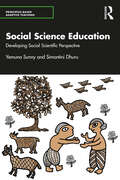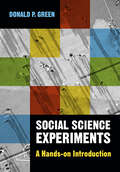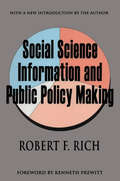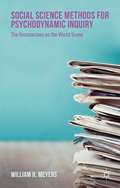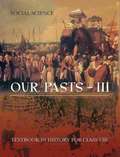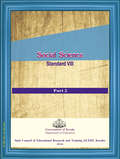- Table View
- List View
Social Science Education: Developing Social Scientific Perspective (Principles-based Adaptive Teaching)
by Simantini Dhuru Yemuna SunnyThis book provides an introduction into social science pedagogy in India. It delves into the interrelationships between society, social relationships, education, and learning.Social science education in schools helps build a critical understanding of social processes and institutions. This book critically examines school spaces and approaches to social science teaching and pedagogy in Indian schools. It outlines distinguishing features, differences, and similarities in pedagogical models and also explains how these varied approaches can be applied in the teaching process. The book also addresses the challenges and possibilities of integrating technology in teaching social sciences. Part of the series, ‘Principles-based Adaptive Teaching’, this book will be of interest to students and teachers of education and the social sciences. It will also be of interest to teachers, educators, curriculum designers, policy makers and social science course developers, NGOs, and public and private sector bodies who focus on teaching and learning practices.
Social Science Experiments: A Hands-on Introduction
by Donald P. GreenThis book is designed for an undergraduate, one-semester course in experimental research, primarily targeting programs in sociology, political science, environmental studies, psychology, and communications. Aimed at those with limited technical background, this introduction to social science experiments takes a practical, hands-on approach. After explaining key features of experimental designs, Green takes students through exercises designed to build appreciation for the nuances of design, implementation, analysis, and interpretation. Using applications and statistical examples from many social science fields, the textbook illustrates the breadth of what may be learned through experimental inquiry. A chapter devoted to research ethics introduces broader ethical considerations, including research transparency. The culminating chapter prepares readers for their own social science experiments, offering examples of studies that can be conducted ethically, inexpensively, and quickly. Replication datasets and R code for all examples and exercises are available online.
Social Science I Part-1 class 10 - SCERT Kerala Board-25
by State Council of Educational Research and TrainingThis is the accessible text book of Social Science I Part 1 Class X SCERT Kerala 2025. It covers the chapters Humanism, Liberty Equality Fraternity, Social Analysis: Through Sociological Imagination, Wealth and the World and Public Opinion in Democracy.
Social Science II Part-1 class 10 - SCERT Kerala Board-25
by State Council of Educational Research and TrainingThis is the accessible text book of Social Science II Part 1 Class X SCERT Kerala 2025. It covers the chapters Weather and Climate, Climatic Regions and Climate Change, From The Rainy Forests to The Land of Permafrost, Consumer: Rights and Protection and Money and Economy.
Social Science Information and Public Policy Making
by Robert F. RichA survey of federal officials reveals the belief that government should make the fullest possible use of social science information-and yet most of the information developed by social scientists winds up in specialized libraries or data banks, where it remains unused. Why don't public officials make greater use of the information social scientists develop? What can social scientists do to ensure that their findings are used? To answer these and related questions, Robert Rich reports the results of a unique experiment designed to facilitate the use of research data by public officials in federal agencies. Rich interviewed both researchers and users of research data over the two-year life of a Continous National Survey (CNS) experiment to discover the extent to which the CNS mechanism was successful and to record the levels and types of use that officials made of the data provided. Rich reveals that factors such as the timeliness, cost, and relevance of data do not guarantee that information will be used. He examines patterns in the actual use of survey data by agency officials and explores key organizational factors, such as the compatibility of information with various bureaucratic interests. He discusses the preoccupation of public officials with bureaucratic issues regarding the ownership and control of information, identifies the incentives that prompt bureaucrats to pass along new information and the government officials' difficulties in developing policies and programs for meeting national needs. Rich notes that studies of knowledge inquiry systems, found in the research literature of many social science disciplines have been dominated by a "rationalistic bias." This "bias" is expressed in terms of the belief that the act of acquiring information will automatically lead to its use, in turn, automatically leading to improved policy or decisions. He contends that empirical studies of how information is actually used do not support the assumptions of rational choice theory. The new chapter also discusses types of information, knowledge, and use; prospects for the development of learning organizations in government; and the politics of expertise. This book will be of interest to social scientists and public policy makers. Robert F. Rich is professor of law and political science at the University of Illinois at Urbana-Champaign. He is also professor in the Institute of Government and Public Affairs, and was the director of that Institute from 1986-1997. He is the founding editor of Knowledge: Creation, Diffusion, Utilization (now Science Communication).
Social Science Methodology: A Unified Framework (2nd Edition)
by John GerringJohn Gerring's exceptional textbook has been thoroughly revised in this second edition. It offers a one-volume introduction to social science methodology relevant to the disciplines of anthropology, economics, history, political science, psychology and sociology. This new edition has been extensively developed with the introduction of new material and a thorough treatment of essential elements such as conceptualization, measurement, causality and research design. It is written for students, long-time practitioners and methodologists and covers both qualitative and quantitative methods. It synthesizes the vast and diverse field of methodology in a way that is clear, concise and comprehensive. While offering a handy overview of the subject, the book is also an argument about how we should conceptualize methodological problems. Thinking about methodology through this lens provides a new framework for understanding work in the social sciences.
Social Science Methods for Psychodynamic Inquiry
by William R. MeyersThis book explains, with case examples, a variety of social science research methods suitable for studying the unconscious components of irrational social and political actions in world affairs, which can be defined as those that are intensely destructive, self-destructive, or extremely bizarre. The book argues that they are driven in part by feelings and fantasies that are outside of conscious awareness. Meyers explores the role of empathy in clinical understanding, as well as the value of exposing assertions to empirical disconfirmation. With a variety of research methods such as survey research, content analysis, and narrative analysis, and case examples such as studies of 'irreal' statements by authoritarian leaders, fabricated newspaper articles and climate change denial, this book sheds light on how to conduct research on psychodynamic matters in a scientifically valid and credible way.
Social Science Our Pasts-3 class 8 - NCERT - 23 (History)
by National Council of Educational Research and Training"Social Science Our Pasts - III" by NCERT provides a comprehensive exploration of history, focusing on the period from the 18th century to the mid-20th century. The book delves into various aspects of Indian history during this period, including the British colonial rule, the rise of nationalist movements, and the struggle for independence. It examines significant events such as the Revolt of 1857, the growth of Indian nationalism, and the partition of India. Through engaging narratives and primary sources, the book offers insights into the socio-economic, political, and cultural transformations that shaped India's history during this crucial era. Additionally, it highlights the contributions of prominent figures like Mahatma Gandhi, Jawaharlal Nehru, and Subhas Chandra Bose in the struggle against colonialism and the quest for freedom. With its interdisciplinary approach and emphasis on critical thinking, "Social Science Our Pasts - III" serves as an invaluable resource for students and educators alike, fostering a deeper understanding of India's past and its implications for the present and future.
Social Science Part 1 class 5 - Kerala Board
by State Council of Educational Research and TrainingSocial Science text book, class V, SCERT Kerala syllabus, english medium. It covers the chapters A Road to History, From Stone to Metal, Our Family, Spend Carefully and Universe : A Great Wonder, Continents and Oceans.
Social Science Part 1 class 7 - Karnataka Board: ಸಮಾಜ ವಿಜ್ಞಾನ ಭಾಗ 1 ವರ್ಗ 7 - ಕರ್ನಾಟಕ ಮಂಡಳಿ
by Karantaka Patya pustaka sanghaIts an 7th standard kannada medium social science part-1 text book.
Social Science Part 1 class 8 - Karnataka board: ಸಮಾಜ ವಿಜ್ಞಾನ ಭಾಗ 1 ನೇ ತರಗತಿ 8 - ಕರ್ನಾಟಕ ಮಂಡಳಿ
by Karnataka Patyapusthaka SanghaSocial Science Part-1 text book for 8th Standard Kannada Medium, Karnatka State
Social Science Part 1 class 9 - Karnataka Board: ಸಮಾಜ ವಿಜ್ಞಾನ ಭಾಗ 1 ನೇ ತರಗತಿ 9 - ಕರ್ನಾಟಕ ಮಂಡಳಿ
by Karnataka Patyapusthaka SanghaSocial Science Part- 1 Textbook for 9th Standard Kannada Medium, Karnataka State
Social Science Part 2 class 5 - Kerala Board
by State Council of Educational Research and TrainingSocial Science text book 2, class V, SCERT Kerala syllabus, english medium. It covers the chapters Changes Wrought by Iron, Non-Violence, Wisdom, Power, For the People, In the Land of Kerala and Our India.
Social Science Part 2 class 8 - Karnataka Board: ಸಮಾಜ ವಿಜ್ಞಾನ ಭಾಗ 2 ನೇ ತರಗತಿ 8 - ಕರ್ನಾಟಕ ಮಂಡಳಿ
by Karnatka Patyapusthaka SanghaSocial Science Part-2 textbook for 8th standard kannada medium, Karnataka State
Social Science Part 2 class 8 - S.C.E.R.T. - Kerala Board
by State Council of Educational Research and TrainingSocial Science Part 2 text book for 8th standard from State Council of Educational Research and Training (S.C.E.R.T.) Kerala in English.
Social Science Part 2 class 9 - Karnataka board: ಸಮಾಜ ವಿಜ್ಞಾನ ಭಾಗ 2 ನೇ ತರಗತಿ 9 - ಕರ್ನಾಟಕ ಮಂಡಳಿ
by Karnataka Patyapusthaka SanghaSocial Science Part-2 text book for 9th Kannada Medium,, Karnataka State
Social Science Part- 1 class 7 (Revised Textbook 2024) - Karnataka Board: 7ನೇ ತರಗತಿ ಸಮಾಜ ವಿಜ್ಞಾನ (ಪರಿಷ್ಕೃತ ಪಠ್ಯಪುಸ್ತಕ 2024) ಭಾಗ- 1
by Karnataka Patyapustaka Sanghaಇದು ಪಠ್ಯಕ್ರಮದ ಪ್ರಕಾರ KTBS ನಿಂದ 7 ನೇ ತರಗತಿಯ ಕನ್ನಡ ಮಾಧ್ಯಮದ ವಿದ್ಯಾರ್ಥಿಗಳಿಗೆ ಶೈಕ್ಷಣಿಕ ಪಠ್ಯ ಪುಸ್ತಕವಾಗಿದೆ.
Social Science Part-1 class 10 (Revised 2024) - Karnataka Board: ಹತ್ತನೇ ತರಗತಿ ಸಮಾಜ ವಿಜ್ಞಾನ (ಪರಿಷ್ಕೃತ 2024) ಭಾಗ-1
by Karnataka Patyapustaka Sanghaಇದು ಪರಿಷ್ಕೃತ 2024 ಪಠ್ಯಕ್ರಮದ ಮೂಲಕ 10 ನೇ ತರಗತಿಯ ಕನ್ನಡ ಮಾಧ್ಯಮ ವಿದ್ಯಾರ್ಥಿಗಳಿಗೆ ಶೈಕ್ಷಣಿಕ ಪಠ್ಯ ಪುಸ್ತಕವಾಗಿದೆ.
Social Science Part-1 class 6 - Karnataka Board
by Karnataka Textbook SocietyThe Social Science Part 1 – Class 6 textbook by the Karnataka Textbook Society offers an engaging and foundational overview of India’s historical, civic, and geographical heritage for young learners. Revised in 2024 to align with NCF 2005 and KCF 2007, the book adopts a child-centric and activity-based approach. The history section introduces students to prehistory, India’s cultural values, and Karnataka’s regional diversity. Lessons highlight India’s contributions to mathematics, science, and religion, and promote values such as non-violence and religious tolerance. The civics portion emphasizes responsible citizenship, constitutional values, and the types of government. Geography lessons build map-reading skills and explore the Earth’s major landforms. The textbook is thoughtfully structured to reduce rote learning, encourage curiosity, and support inclusivity. Special attention is given to integrating visuals, timelines, and activities to promote critical thinking, local relevance, and holistic development.
Social Science Part-1 class 8 (Revised Textbook 2024) - Karnataka Board: 8ನೇ ತರಗತಿ ಸಮಾಜ ವಿಜ್ಞಾನ (ಪರಿಷ್ಕೃತ ಪಠ್ಯಪುಸ್ತಕ 2024) ಭಾಗ- 1
by Karnataka Patyapustaka Sanghaಇದು ಪಠ್ಯಕ್ರಮದ ಪ್ರಕಾರ KTBS ನಿಂದ 8 ನೇ ತರಗತಿಯ ಕನ್ನಡ ಮಾಧ್ಯಮದ ವಿದ್ಯಾರ್ಥಿಗಳಿಗೆ ಶೈಕ್ಷಣಿಕ ಪಠ್ಯ ಪುಸ್ತಕವಾಗಿದೆ.
Social Science Part-1 class 9 - Karnataka Board
by Karnataka Textbook SocietyThe Karnataka Government 9th Social Studies Part 1 syllabus covers History, Political Science, Sociology, Geography, Economics, and Business Studies. It aims to help students understand the state's past, present, and future. Students will learn about the major events and personalities in history, the physical features and climate of the state, its economy, government, and culture. It helps the students develop critical thinking skills and the ability to analyze information. The syllabus is comprehensive, also a valuable resource for students who are interested in History, Political Science, Sociology, Geography, Economics, and Business Studies.
Social Science Part-2 class 10 (Revised 2024) - Karnataka Board: ಹತ್ತನೇ ತರಗತಿ ಸಮಾಜ ವಿಜ್ಞಾನ (ಪರಿಷ್ಕೃತ 2024) ಭಾಗ-2
by Karnataka Patyapustaka Sanghaಇದು ಪರಿಷ್ಕೃತ 2024 ಪಠ್ಯಕ್ರಮದ ಮೂಲಕ 10 ನೇ ತರಗತಿಯ ಕನ್ನಡ ಮಾಧ್ಯಮ ವಿದ್ಯಾರ್ಥಿಗಳಿಗೆ ಶೈಕ್ಷಣಿಕ ಪಠ್ಯ ಪುಸ್ತಕವಾಗಿದೆ.
Social Science Part-2 class 7 (Revised Textbook 2024) - Karnataka Board: 7ನೇ ತರಗತಿ ಸಮಾಜ ವಿಜ್ಞಾನ (ಪರಿಷ್ಕೃತ ಪಠ್ಯಪುಸ್ತಕ 2024) ಭಾಗ- 2
by Karnataka Patyapustaka Sanghaಇದು ಪಠ್ಯಕ್ರಮದ ಪ್ರಕಾರ KTBS ನಿಂದ 7 ನೇ ತರಗತಿಯ ಕನ್ನಡ ಮಾಧ್ಯಮದ ವಿದ್ಯಾರ್ಥಿಗಳಿಗೆ ಶೈಕ್ಷಣಿಕ ಪಠ್ಯ ಪುಸ್ತಕವಾಗಿದೆ.
Social Science Part-2 class 8 (Revised Textbook 2024) - Karnataka Board: 8ನೇ ತರಗತಿ ಸಮಾಜ ವಿಜ್ಞಾನ (ಪರಿಷ್ಕೃತ ಪಠ್ಯಪುಸ್ತಕ 2024) ಭಾಗ- 2
by Karnataka Patyapustaka Sanghaಇದು ಪಠ್ಯಕ್ರಮದ ಪ್ರಕಾರ KTBS ನಿಂದ 8 ನೇ ತರಗತಿಯ ಕನ್ನಡ ಮಾಧ್ಯಮದ ವಿದ್ಯಾರ್ಥಿಗಳಿಗೆ ಶೈಕ್ಷಣಿಕ ಪಠ್ಯ ಪುಸ್ತಕವಾಗಿದೆ.
Social Science Part-2 class 9 (Revised 2024) - Karnataka Board: 9ನೇ ತರಗತಿಯ ಸಾಮಾಜ ವಿಜ್ಞಾನ (ಪರಿಷ್ಕೃತ ಪಠ್ಯಪುಸ್ತಕ 2024) ಭಾಗ- 2
by Karnataka Patyapustaka Sanghaಇದು ಪಠ್ಯಕ್ರಮದ ಪ್ರಕಾರ KTBS ನಿಂದ 9ನೇ ತರಗತಿಯ ಕನ್ನಡ ಮಾಧ್ಯಮದ ವಿದ್ಯಾರ್ಥಿಗಳಿಗೆ ಶೈಕ್ಷಣಿಕ ಪಠ್ಯ ಪುಸ್ತಕವಾಗಿದೆ.
